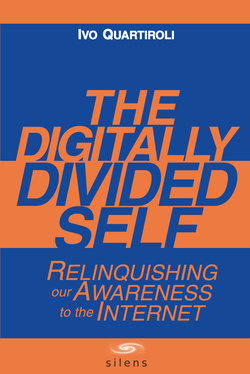Читать книгу The Digitally Divided Self: Relinquishing our Awareness to the Internet - Ivo Ph.D. Quartiroli - Страница 8
На сайте Литреса книга снята с продажи.
What’s Not Computable Isn’t Real
ОглавлениеWriting for computer science magazines in the mid ’80s, I alternated technical articles with interviews of philosophers and psychologists about the inner and social implications of the computer revolution, including a column called “Loops” for Informatica Oggi magazine, the leading computer Italian science magazine at the time. My heretical column was scrapped by the publisher after only a few months because some readers complained that those subjects had nothing to do with computer science, and that they’d rather read “real” and “useful” information.
Turning the view 180 degrees toward the inner side, from what we can do with technology to what technology does to us wasn’t a very popular move. Anything that smells of the philosophical, the inner, or the metaphysical is still seen with suspicion by people into technology, who categorize those perspectives as “things which could even be interesting, but vague and non-scientific.” For the most part, challenging technology has become almost taboo in our culture. As Neil Postman (1993) contended: “‘The computer shows…’ or ‘The computer has determined…’ is Technopoly’s equivalent of the sentence, ‘It is God’s will’ and the effect is roughly the same.”
Technology seems “inevitable.” It is rarely considered that people who are sensitive to what technology does to us might embrace and use technology – though they do it from 360 degrees instead of looking just at the bright front side.
In advanced technological societies there is a reticence to acknowledge the inner, the spiritual, or the metaphysical dimensions of life. The inner is seen pertinent only to religion, reinforcing the historical division of powers which gave science dominion over matter and religion dominion over the soul. What is non-calculable or non-objective is mostly ignored, as are the implications of technology for our psyche.
Sensitivity to the inner is easily branded new-ageism, fundamentalism, or plain weirdness. Meditation is misunderstood as thinking. The body-mind connection is something to decode by DNA sequences. Going beyond the mind is misunderstood as going below the functionality of mind, dulled rather than perceiving more deeply. Understanding is something which we infer only intellectually. The inner void is something we become aware of only when the computer hangs and we are left to stare blankly at the screen. Mind is seen mainly in terms of cognitive capacities and performance, a set of neurotransmitters which can eventually be “fixed” or “enhanced” by pharmacological molecules.
